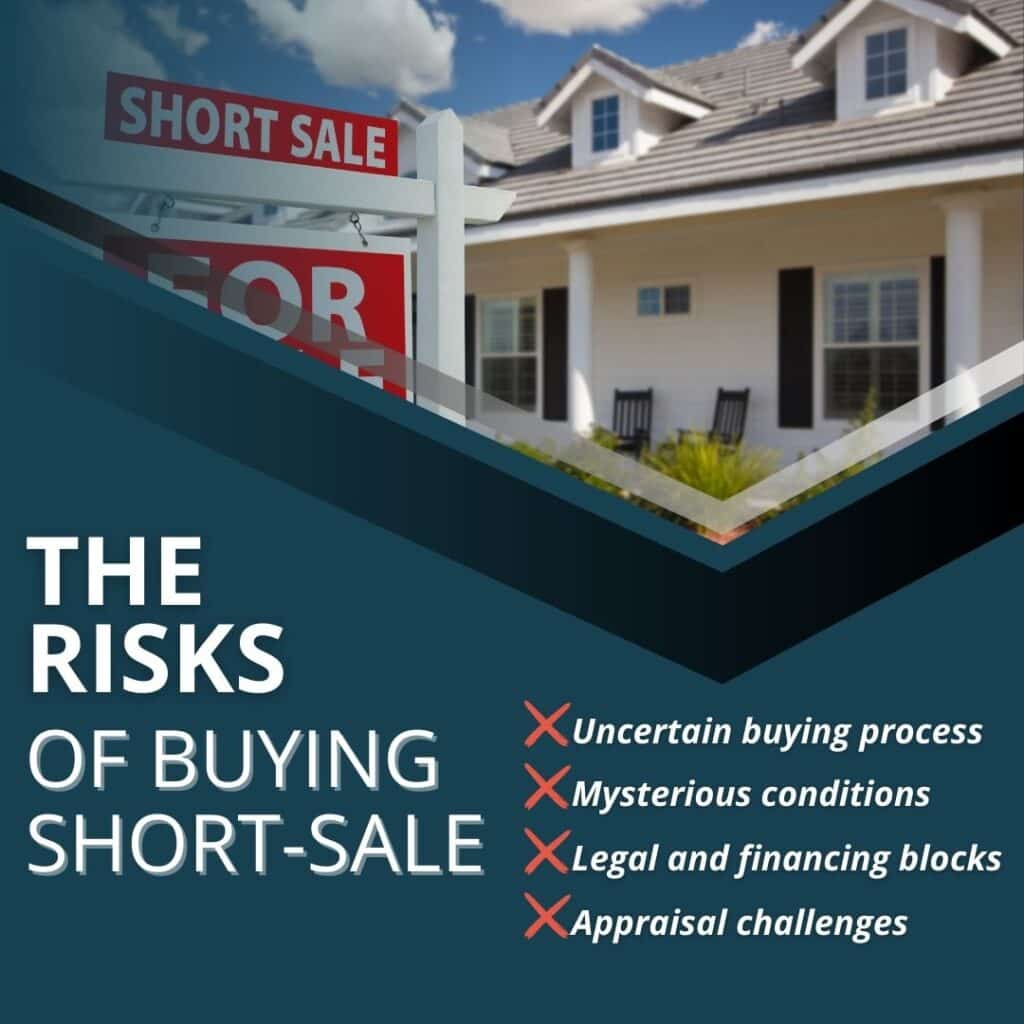A short sale might seem like a great deal on a “fixer-upper”, but the process isn’t as simple as buying a traditional home—sometimes, the risks outweigh the perks. Buyers should be prepared for a longer timeline, potential repair issues, and other roadblocks that could make the purchase more challenging than is worthwhile.
Before making an offer, it’s important to understand the biggest risks involved and how they align with your goals. This is your guide on what to watch for when considering a short-sale home and how to protect yourself in the long run.
Table of Contents
ToggleWhat is a Short-Sale?
With the lender’s approval, a short sale happens when a homeowner sells their property for less than what they owe on the mortgage.
Usually, it occurs when the homeowner is struggling financially and wants to avoid foreclosure. However, unlike a foreclosure, where the bank takes ownership and sells the home directly, a short sale keeps the owner involved in the process.
For buyers, this can mean getting a home at a lower price, but it also comes with challenges. Since the lender has to approve the sale, the process can take much longer than a standard home purchase.
Plus, short-sale homes are often sold as-is, meaning repairs and maintenance may have been neglected. Understanding these factors upfront can help you decide if a short-sale home is the right choice for you.

1) Long and Uncertain Buying Process
Short sales don’t follow the same timeline as a typical home purchase. Even if a seller accepts your offer, the lender has the final say—and that approval process can take months.
Banks review each short sale carefully to determine if selling at a loss is their best option. They may also need to negotiate with other lienholders, such as second mortgage lenders or homeowners associations, which can add more delays.
Unlike a traditional sale, where you negotiate directly with the seller, a short sale often involves multiple parties, each with its own requirements. Some lenders reject offers outright, while others counter with a higher price or demand specific terms.
In some cases, they may cancel the sale altogether if the seller’s financial situation changes or if they decide foreclosure is the better route.
For buyers, this uncertainty can make it difficult to plan. You might wait weeks or months without an update, only to find out the deal is falling through.
If you’re on a tight timeline or need a home quickly, a short sale may not be the best option.
2) Property Condition May Be a Mystery
As mentioned earlier, short-sale homes are often sold as-is, meaning the seller won’t cover repairs or maintenance before closing.
Since many homeowners in short sales are struggling financially, they may have deferred necessary upkeep for months or even years. This can leave buyers with unexpected repair costs that significantly impact the overall affordability of the home.
Some of the most common issues found in short-sale properties include:
- Leaks and water damage from neglected plumbing or roof problems
- Mold and pest infestations due to lack of routine maintenance
- Outdated or failing electrical and HVAC systems that may not meet modern safety standards
- Structural concerns like foundation cracks or wood rot that can lead to expensive repairs
Unlike a standard home sale, you’ll likely have limited room to negotiate repairs. Sellers may not have the funds to fix issues, and banks are typically unwilling to cover repair costs as part of the deal.
This makes a professional home inspection essential—it’s the best way to uncover hidden problems before finalizing the purchase.
3) Financial and Legal Roadblocks
Short sales can come with financial and legal complications that aren’t always obvious upfront.
Since a short sale might have several parties involved, like lenders, second mortgage holders, homeowners associations, and even tax authorities, each of them has a financial interest in the property. Ultimately, that can delay or even block the sale.
Some common financial and legal challenges buyers might face include:
- Unpaid liens or debts attached to the home that must be settled before closing
- HOA fees, property taxes, or utility bills in arrears that may fall on the buyer
- Foreclosure risk—if the seller’s financial situation worsens, the home could be repossessed before the short sale is finalized
Even when an offer is accepted, the bank may add conditions that increase costs or make financing more difficult. Some lenders require the buyer to cover extra fees or accept unfavorable terms, leaving little room for negotiation.
Because of these potential roadblocks, you should try to research the property’s financial history and consult with professionals experienced in short-sale transactions before committing.
4) Appraisal and Loan Challenges
Getting financing for a short-sale home isn’t always straightforward. Even if you secure a mortgage pre-approval, the home still needs to meet your lender’s requirements—and that’s where problems can arise.
One major issue is the appraisal. Lenders require an appraisal to confirm the home’s value, but short-sale homes don’t always appraise for the agreed purchase price.
If the appraisal comes in lower than expected, buyers may need to:
- Pay the difference out of pocket
- Renegotiate with the seller (which can be difficult in a short sale)
- Find alternative financing or back out of the deal
In some cases, the home may not meet the lender’s condition requirements for financing. Issues like a failing roof, outdated electrical systems, or structural concerns can cause the mortgage to be denied unless repairs are made—which typically falls on the buyer since short-sale sellers often can’t afford fixes.
If you’re considering a short-sale home, it’s essential to discuss financing options with your lender in advance. Some mortgage types, like FHA and VA loans, have stricter property condition standards, making short-sale purchases even more challenging.

Other Important Considerations
Beyond the financial, legal, and repair risks, short-sale homes come with additional challenges that buyers often overlook.
Before committing to a purchase, consider these potential pitfalls:
- Title Issues – Some short-sale homes have unclear ownership histories, missing paperwork, or unresolved liens that can complicate the closing process. A title search can help uncover any hidden claims on the property.
- HOA Restrictions and Fees – If the home is in a community with a homeowners association (HOA), unpaid dues or special assessments may fall on the buyer. Some HOAs also have restrictions that could affect renovations or property use.
- Changing Market Conditions – Since short sales can take months to finalize, the home’s market value could shift before closing. If prices drop, you may end up paying more than the home is worth.
- Delayed Move-In Timeline – Even after closing, there may be unexpected delays before you can move in, especially if the seller needs extra time to vacate or if legal paperwork takes longer to process.
- Insurance Complications – Some short-sale homes may not qualify for standard homeowners insurance due to property condition or location risks. Getting quotes early can help you plan for any coverage challenges.
When to Call a Professional
Buying a short-sale home might come with hidden risks that aren’t obvious during a standard walkthrough.
Since these properties are often sold as-is, a professional home inspection is critical to uncovering potential safety hazards, structural problems, or expensive repairs before you commit.
An inspection can reveal:
- Roof damage, leaks, or structural issues that could cost thousands to fix
- Electrical or plumbing problems that might not meet modern safety codes
- Pest infestations, mold, or water damage from years of neglected maintenance
- HVAC or foundation issues that could affect the home’s long-term stability
Unlike a traditional home sale, where you might negotiate repairs, short-sale buyers typically take on these risks themselves. That’s why having a detailed inspection report is essential—it helps you understand the full scope of repairs needed and decide whether the home is still worth the investment.
If major issues are uncovered, you’ll at least know what you’re walking into instead of facing costly surprises after closing.
Conclusion
Buying a short-sale home can seem like a great way to save money, but it comes with unique risks. The lengthy approval process, potential repair costs, legal complications, and other challenges can make the purchase far more complicated.
If you’re considering a short-sale property, the smartest step you can take is to schedule a professional home inspection before closing. Tier 1 Pro Inspections provides detailed, thorough evaluations to help buyers uncover hidden issues, avoid costly surprises, and make confident decisions.

